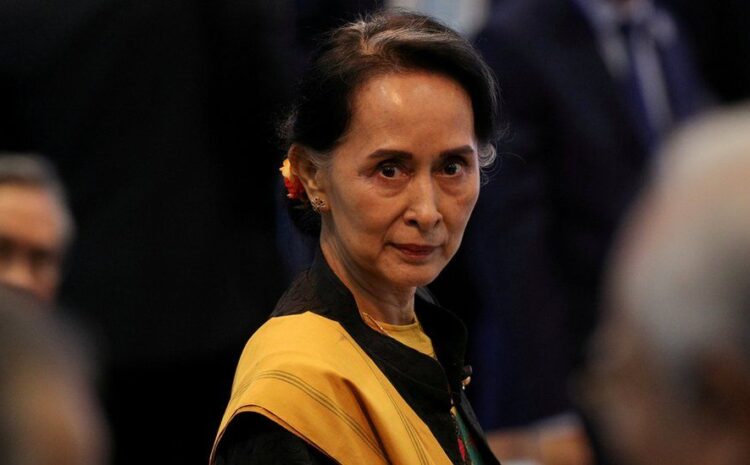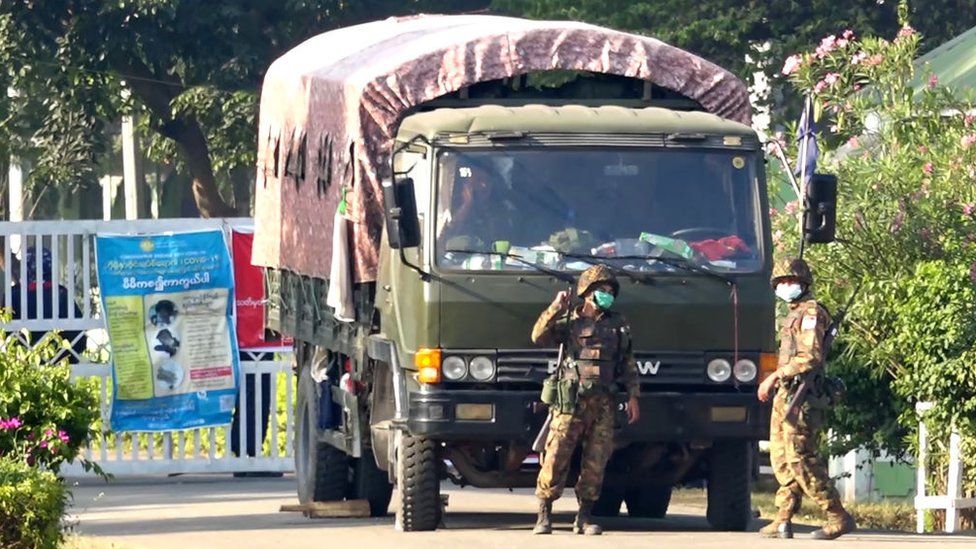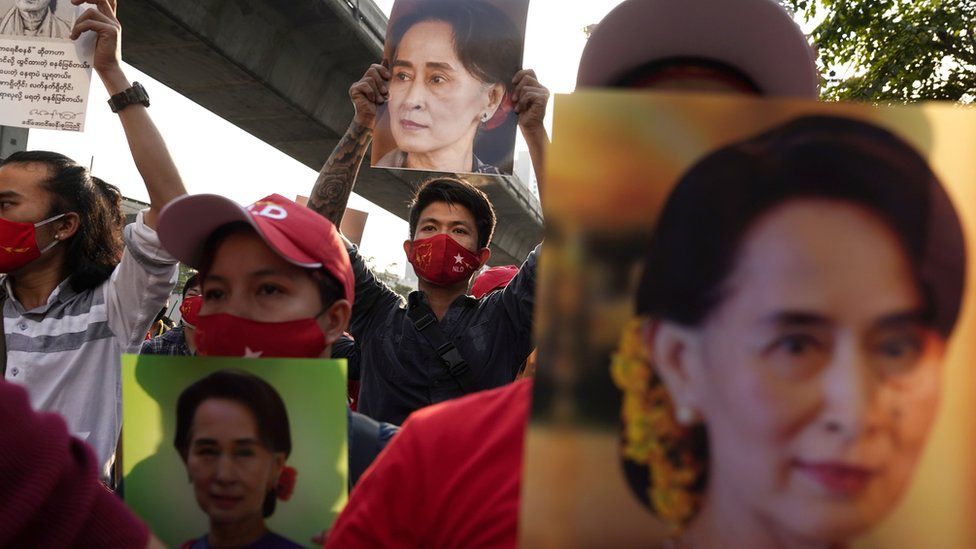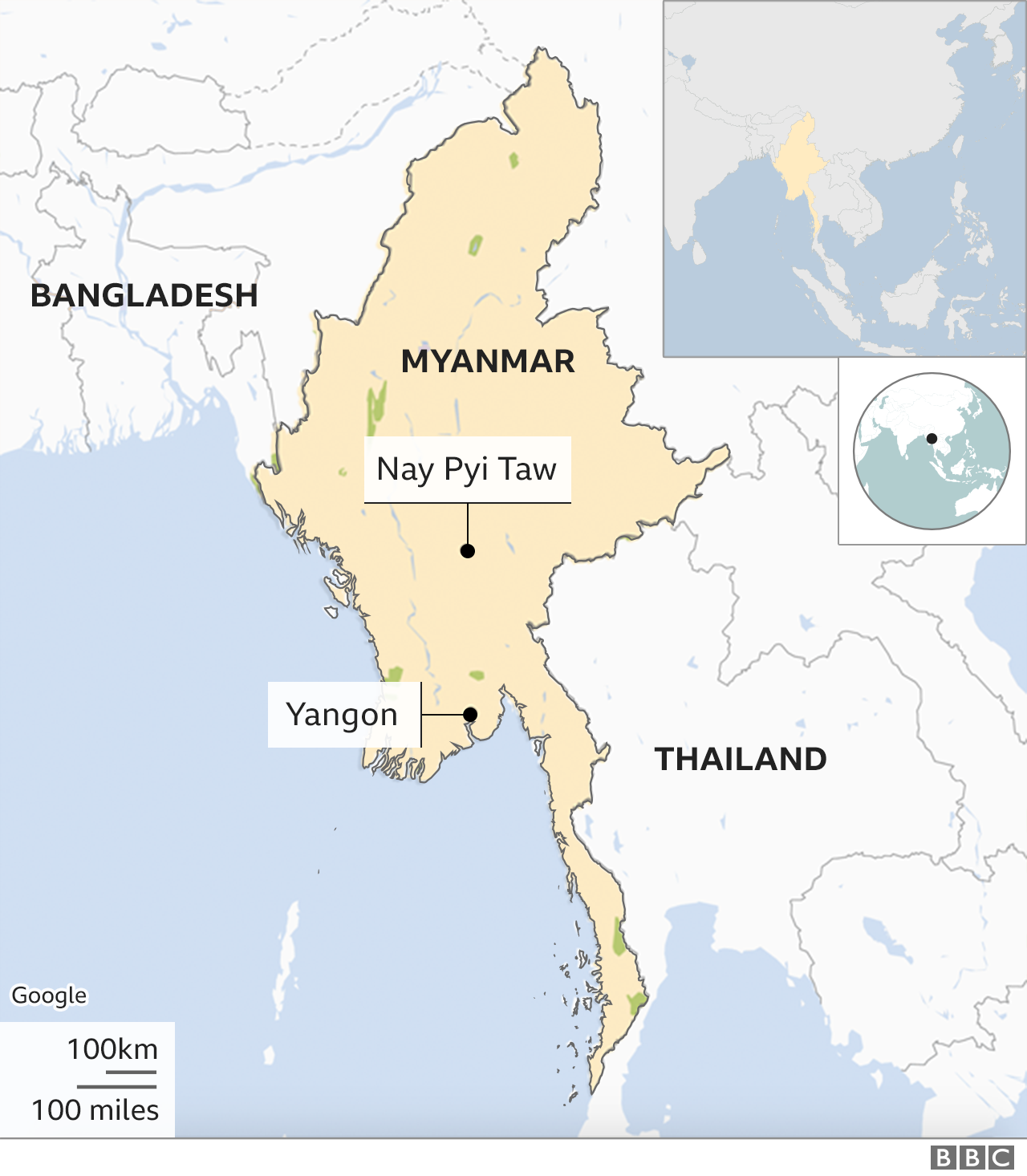
IMAGE COPYRIGHTREUTERS image captionMs Suu Kyi is thought to be under house arrest
Ms Suu Kyi has not been seen in public since she was detained by the military.
It took power after declaring a state of emergency, accusing Ms Suu Kyi’s party of fraud over its election win.
US President Joe Biden has threatened to reinstate sanctions on Myanmar as a result, saying the military should not “overrule the will of the people”.
Sanctions had only recently been eased, after the country began emerging from a decades-long military dictatorship.
Ms Suu Kyi’s party, the National League for Democracy (NLD), demanded her immediate release on Tuesday. It has also called upon the military to accept the results of the November election, which saw the NLD win more than 80% of the votes.
Where is Aung San Suu Kyi?
There have been no official statements on Ms Suu Kyi’s exact whereabouts since she was detained in pre-dawn raids on Monday.
But unnamed sources from within the NLD have said both she and President Win Myint were being held under house arrest.
“We were informed not to worry. However we are worrying. It would be a relief if we could see photos of them at home,” the MP told news agency AFP, on condition of anonymity.
Many of the other detained lawmakers are also still held in their government housing in the capital Nay Pyi Taw, with one member of the NLD describing it as “an open-air detention centre”.
Ms Suu Kyi – who spent nearly 15 years in detention between 1989 and 2010 – has urged her supporters to “protest against the coup” in a letter written before she was detained. It warned the military’s actions would put the country back under a dictatorship.
What is the situation now in Myanmar?
One day after the coup, the country appears to be in an uneasy calm. The streets remained quiet on Monday night and Tuesday morning, with troops patrolling all major cities and a night-time curfew in force.
The communications systems which had been disrupted on Monday had returned by Tuesday morning, phone and internet connections were running again.
On the streets of the main city, Yangon, people said they felt their hard-fought battle for democracy had been lost.
 IMAGE COPYRIGHT GETTY IMAGES
IMAGE COPYRIGHT GETTY IMAGESMyanmar, also known as Burma, was ruled by the armed forces until 2011, when democratic reforms led by Ms Suu Kyi ended military rule.
One 25-year-old resident, who asked not to be named, told the BBC: “Waking up to learn your world has been completely turned upside down overnight was not a new feeling, but a feeling that I thought that we had moved on from, and one that I never thought we’d be forced to feel again.”

Frustration and anger
By Nyein Chan Aye Yangon, BBC Burmese, Yangon
This city of more than five million people is trying to get back to normal but has yet to digest the previous day’s events.
The streets are quieter than usual this morning and security forces are deployed at major points. Panic buying has stopped and telecommunications services are back.
Private banks are resuming their services after temporarily closing down on Monday. Many people are withdrawing cash to brave the uncertain times ahead.
In the capital Nay Pyi Taw, troops with tanks and trucks still surround the country’s parliament.
It has been a bloodless coup so far, but the impact could be severe at a time of economic downturn amid the Covid pandemic.
The political turmoil, with possible international sanctions and foreign investment now uncertain, has left people frustrated and angry.

How did the coup unfold?
In the early hours of Monday, the military’s television station said power had been handed over to commander-in-chief Min Aung Hlaing.
No major violence was been reported and soldiers blocked roads in Nay Pyi Taw and the main city, Yangon.
International and domestic TV channels, including the state broadcaster, went off air. Internet and phone services were disrupted. Banks said they had been forced to close.
The military declared a year-long state of emergency and has already replaced 11 ministers and deputies, including in finance, health, the interior and foreign affairs.
The military takeover follows weeks of tensions between the armed forces and the government following parliamentary elections lost by the army-backed opposition.
The opposition had demanded a re-run of the election, raising allegations of widespread fraud that were not backed by the electoral commission.
Will sanctions work?
Along with the US, the United Nations, the UK and the EU have also condemned the military takeover amid fears of potential protests and unrest.
In a statement, Mr Biden said “force should never seek to overrule the will of the people or attempt to erase the outcome of a credible election”.
The US had removed sanctions over the past decade as Myanmar progressed towards democracy. Mr Biden said this would be urgently reviewed, adding: “The United States will stand up for democracy wherever it is under attack.”
 IMAGE COPYRIGHT REUTERS
IMAGE COPYRIGHT REUTERSIt is unclear though how much effect the US warnings will have. The coup leaders will have expected sanctions and factored those into their plans.
Toe Zaw Latt, Myanmar bureau chief of the Democratic Voice of Burma (DVB), told the BBC that the military will know sanctions are an unavoidable consequence of their actions, adding that “they don’t care about Western sanctions” and are more concerned “about how China, Japan, South Korea respond”.
“The country enjoys Chinese protection and South East Asian markets,” Myanmar expert Elliott Prasse-Freeman of the National University of Singapore explains.
“Hence I expect them to react to sanctions with a shrug, the price paid for reasserting power and assuaging the humiliation of losing to their democratic enemies in two consecutive elections.”
China, which has previously opposed international intervention in Myanmar, urged all sides in the country to “resolve differences”. Other countries in the region, including Cambodia, Thailand and the Philippines, have said it is an “internal matter”.
Meanwhile, the UN Secretary-General António Guterres called the military’s move a “serious blow to democratic reforms”, as the security council prepared for an emergency meeting. The UN demanded the release of the people it believed had been detained.
In the UK, Prime Minister Boris Johnson condemned the coup and Aung San Suu Kyi’s “unlawful imprisonment”.
European Union leaders have issued similar condemnations.

